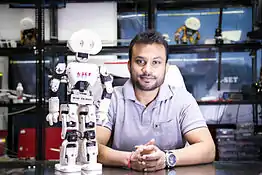Diwakar Vaish
Prof. Diwakar Vaish (/dɪˈvækər ˈvæʃ/ div-AK-ər VASH;[1] born 23 July 1992) is an Indian born robotics researcher and Head of Robotics and Research at A-SET Training and Research Institutes (2010–present).[2] He is the developer of India's first completely indigenous 3D printed humanoid robot (Manav), India's first mind controlled robot, and world's first production brain controlled wheelchair.[3][4] These technologies and robots were developed at the labs of A-SET Training & Research Institutes.[3][5] Diwakar is the co-creator alongside All India Institute of Medical Sciences, Delhi the world's cheapest ventilator.[6][7][8]
Prof. Diwakar Vaish | |
|---|---|
 Prof. Diwakar Vaish at IIT-Guwahati Techfest- Techniche 2015 | |
| Born | July 23, 1992 Delhi |
| Nationality | Indian |
| Occupation | Roboticist |
| Years active | 2010 - present |
| Known for | Developing 'Manav (robot)'
Researching on mind controlled robots. Creator of the world's first production brain controlled wheelchair |
| Spouse |
Sakshi Dhall (m. 2020) |
| Parents |
|
| Relatives |
|
| Website | diwakarvaish.com |

Manav is India's first 3D printed humanoid robot, It was developed in late 2014 to early 2015. The robot is made on a multi processor platform to enhance research work.

Achievements
- He is the developer and mind behind Manav (India's first completely indigenous 3D printed humanoid robot)[3][4][5]
- He is an alumnus of Sharda University, Noida. He was part of B.Tech. (Computer Science program) from 2010 to 2014 batch
- In 2017, Diwakar Vaish, alongside All India Institute of Medical Sciences, Delhi co-created the world's cheapest and smallest ventilator, the ventilator does not require an artificial oxygen supply and can process atmospheric air, the ventilator, currently in trials, will cost $250 US Dollars[6][7][8]
- He is the developer of Mind controlled Robots (India)[3]
- In 2016, he developed the world's first production brain controlled wheelchair which uses the brain's electrical impulses to command the wheelchair. It has been developed for patients of Locked In Syndrome (LIS).[9][10][11][12]
- He is the developer of an Unmanned Ground Vehicle named "Versatile" which has the capability of changing its shape according to the terrain.[13][14][15]
See also
References
- "Sharda University | The Best Days Of My Life || Diwakar Vaish - B.Tech". Retrieved 29 December 2020.
- ""Robot Show, A robot can read the mind"—a guest lecture by Diwakar Vaish,". Archived from the original on 2015-09-27.
- Menezes, Beryl. "Meet Manav, India's first 3D-printed humanoid robot". livemint.com/. Retrieved 2015-09-30.
- "India's First 3D Printed Humanoid Robot 'Manav' Launched at IIT Mumbai TechFest 2015". Retrieved 2015-09-30.
- "New Delhi Institutes Introduce Manav, India's First 3D-Printed Plastic Robot". Archived from the original on 2015-09-27. Retrieved 2015-09-30.
- "The world's smallest and cheapest ventilator can help millions of patients". healthpost.in. Retrieved 2017-10-28.
- "Awesome! Delhi based duo build world's cheapest and smallest ventilator that fits in pocket; price will floor you". The Financial Express. 2017-09-13. Retrieved 2017-10-28.
- "Delhi robotic engineer develops world's cheapest pocket ventilator". hindustantimes.com/. 2017-09-13. Retrieved 2017-10-28.
- "No buttons, no joystick; please welcome the world's first mind-controlled wheelchair". indiatoday.intoday.in. Retrieved 2016-03-21.
- "Wheelchair that operates by mind , Tech , Aninews". aninews.in. Retrieved 2016-03-21.
- "Indian develops mind-controlled wheelchair". www.inshorts.com. Retrieved 2016-03-21.
- Newzstreet TV (2016-03-17), 1st mind controlled wheelchair makes movement easy for paralytic patients, retrieved 2016-03-21
- "A Robot Can Read the Mind Says Diwakar Vaish | INDIA CSR | India's Largest CSR News Network". www.indiacsr.in. Retrieved 2015-10-07.
- "Robot that can read your mind". The Hindu. 2013-10-27. ISSN 0971-751X. Retrieved 2015-10-07.
- "Overcoming difficulties of Robots which use wheels for mobility which can get stuck on cannot be used in certain landscapes; the Versatile Robot can walk, crawl or even hop! That's not all, the Unmanned Ground Vehicle 'Versatile Robot' is one of its kind as it can change its own shape according to the situations". www.techgoss.com. Retrieved 2015-10-07.
External links
- "Diwakar Vaish - Robotics Researcher". diwakarvaish.com. Retrieved 2015-09-26.
This article is issued from Wikipedia. The text is licensed under Creative Commons - Attribution - Sharealike. Additional terms may apply for the media files.